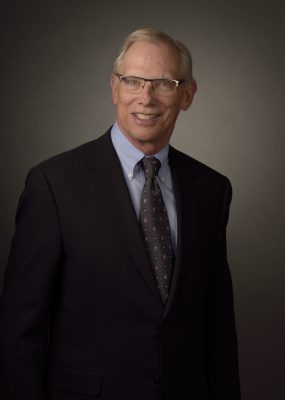Alumnus Spotlight – Grover Wrenn
October 15, 2017

When Grover Wrenn left his hometown, Siler City, N.C., for college, he was certain of one thing. He wanted to make a big difference in the world.

Grover Wrenn (Contributed photo)
As fate would have it, Wrenn was awarded a summer internship in health sciences after his junior year at Florida Presbyterian (now Eckerd) College, and he found his way to the master’s program in environmental sciences and engineering at UNC’s School of Public Health.
Wrenn has great stories about his years at UNC, notably about working with Dr. Lyman Ripperton, former chief chemist for the Los Angeles Pollution Control Office. During the McCarthy era, “Rip” had refused to sign a loyalty oath required of University of California faculty members – and had instead left for North Carolina to teach and conduct research on the health effects of smog.
Wrenn is perhaps proudest of having “recruited” UNC Professor Emeritus Harvey Jeffries:
At the end of the first year in the master’s program, I contacted a college classmate who was completing his first year in the doctoral chemistry program at another university. He wasn’t happy with what he was doing, so I invited him to Chapel Hill to check out the Department of Environmental Sciences and Engineering. He transferred to UNC, got his doctorate and conducted highly acclaimed research in atmospheric chemistry as a faculty member for many years. I always thought I made a great contribution to the UNC School of Public Health recruiting Harvey!
In 1972, Wrenn returned to the UNC public health school for two years as a research associate, leading a team of industrial hygienists in inspecting tire manufacturing and plastics plants. The team’s directive was to assess worker exposures to toxic substances and other occupational health risks.
The discoveries made by the research team, especially related to the toxicity of vinyl chloride, helped put pressure on the newly established Occupational Safety and Health Administration (OSHA) to take action to protect workers. Later, the problem was made more urgent by the announcement that four people in Louisville, KY, who worked in a plant where vinyl chloride exposure was high, had been diagnosed with a rare and fatal cancer.
Because of Wrenn’s expertise, leaders at OSHA invited him to help prepare an emergency temporary standard for vinyl chloride – and subsequently appointed him director of health standards. He held that position for six years, during which time, he directed the development of most of the health standards issued by OSHA.

“My graduate training at the UNC School of Public Health and the two years in the Occupational Health Study Group prepared me for the OSHA job,” he said. “I was the right person with the right skills at the right time largely because of my UNC experience.”
After his years at OSHA, Wrenn became an extremely successful entrepreneur and senior executive in a number of companies, amassing 40 years’ experience in life sciences, environmental services and health-care services. As a retiree, he has traveled the world and developed his talents in photography (see wrennphotography.net), always aware that his training in environmental health gave him a unique and compassionate outlook on the world.
 “I am grateful for my experience at UNC,” Wrenn says. “It helped make me a more capable, curious and caring person – and provided the foundation for my career.”
“I am grateful for my experience at UNC,” Wrenn says. “It helped make me a more capable, curious and caring person – and provided the foundation for my career.”
Higher education is central to the strength of our national economy and the well-being of all people, he says, and private support of public education is essential.
“We don’t always appreciate the fact that public universities receive only a small part of their funding from the state,” he says. “The money really comes from private donors who understand the importance of education to a society. Who are more plausible donors than alumni? We are the direct beneficiaries and know the value of education in our own lives.”
Carolina Public Health is a publication of the University of North Carolina at Chapel Hill Gillings School of Global Public Health. To view previous issues, please visit sph.unc.edu/cph.
